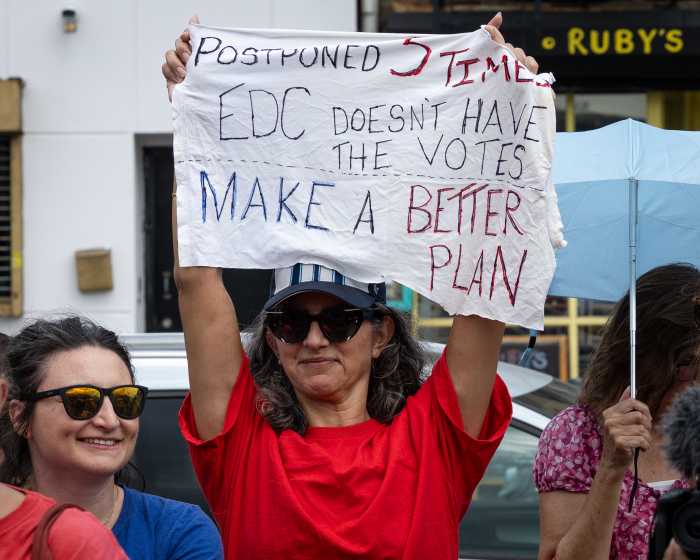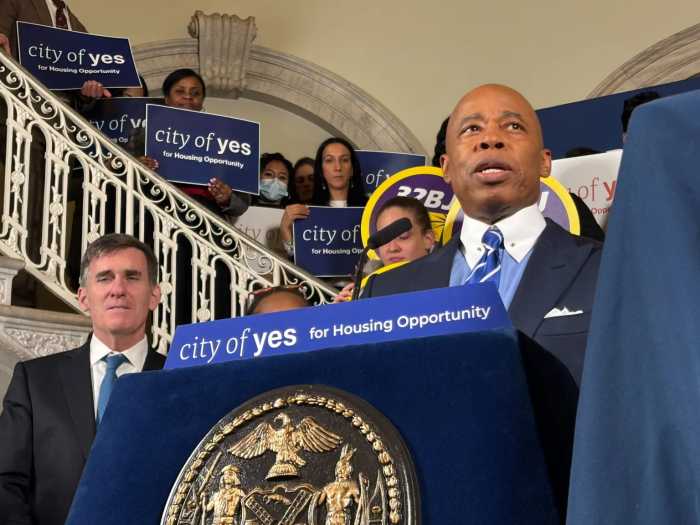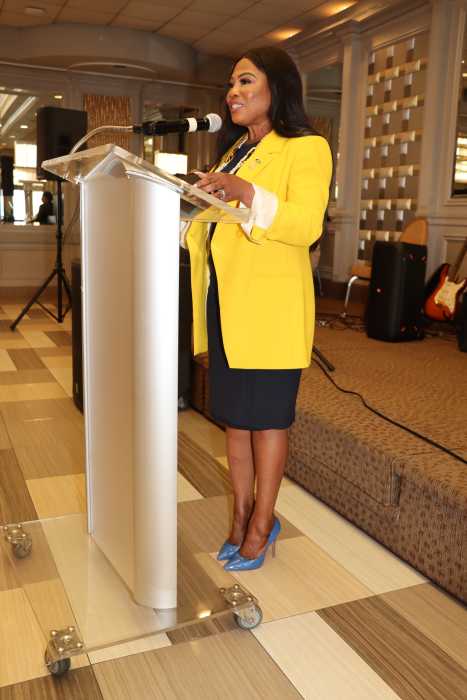How State Marriage Recognition Affects Day-to-Day Life for Wedded Same-Sex Couples
Citing a growing community of same-sex New York couples who have legally married out-of-state and are “starving for information” as to how their unions will be treated here, four leading LGBT advocacy groups have issued a guide to the rights and obligations such couples have under state law.
The five-page document, issued on January 26 by Lambda Legal, the Empire State Pride Agenda, the New York Civil Liberties Union, and the American Civil Liberties Union, outlines a dozen-and-a-half areas — some broad-reaching, others more narrowly tailored — in which the state's policy of recognizing marriages by same-sex couples who legally wed in other jurisdictions have implications for their day-to-day life here in New York.
Those impacts range from eligibility for insurance coverage and workers' compensation benefits, and the right of a biological mother's same-sex spouse to be listed as a parent on a birth certificate at the time of the child's birth, to joint rights on hunting and fishing permits, and the entitlement of married same-sex minimum wage hotel workers to share on-site sleeping quarters.
The report, which also spells out several obligations of married same-sex spouses, leaves unresolved, for the moment, key questions related to taxes — specifically, the right to file jointly on state income tax forms and, also, freedom from having employer contributions to an employee's spousal benefits be treated as income to that employee.
In a January 10 statement emailed to Gay City News, the state Department of Taxation and Finance explained that it was evaluating the issue of marriage recognition as it pertains to both the tax filing status of married same-sex couples and the tax treatment of employer spousal benefits. The guide's authors noted that the department “is expected to give further guidance” in the near future.
New York State's practice of recognizing same-sex marriages of couples who legally wed, in jurisdictions such as Massachusetts, Connecticut, and Canada, began in 2004 when the state comptroller's office first accorded such recognition to participants in the state employee pension funds. The City of New York quickly followed suit, and in 2007, shortly after former Governor Eliot Spitzer, a supporter of marriage equality, took office, the state Civil Service Commission began recognizing same-sex marriages for the benefits program it oversees for state employees as well as many local government units across New York State.
Several developments in the past year, however, significantly accelerated the trend toward universal recognition across New York of same-sex couples married elsewhere — whether or not they are public sector employees.
The first was a ruling last February 1 by the Western New York-based 4th Department of the state court Appellate Division, finding that Rochester's Monroe Community College must recognize the Canadian marriage of Patricia Martinez, an MCC employee, and her spouse, Lisa Ann Golden, in its employee benefits program.
Issued unanimously by an intermediate-level court, the Rochester ruling is a statewide precedent, unless another department of the Appellate Division finds otherwise, in which case the split would have to be resolved at the Court of Appeals, the state's highest bench. The Court of Appeals declined to review the Rochester ruling, saying Monroe County's appeal was premature, and in the meanwhile the county has decided to accept the conclusion of the Martinez case.
Just last week, the Appellate Division's 3th Department, in Albany, concurred with the Martinez court, turning back a challenge from the right-wing Alliance Defense Fund to the Civil Service Commission's policy adopted in 2007.
One key development that resulted from the Martinez ruling — making the newly-released guide particularly relevant — was a directive last May from Governor David Paterson instructing all state agencies to develop policies and regulations for recognizing legal same-sex marriages in their areas of responsibility. The governor's directive specifically cited the precedent created by the Martinez court.
The several appellate rulings and Paterson's directive place New York in a wholly anomalous situation nationwide regarding same-sex marriages. Unlike Massachusetts and Connecticut, same-sex couples cannot legally get married here in New York.
However, unlike most states in the union, New York has no official bar on recognizing same-sex marriages. And unlike at least one other state with no policy officially barring recognition — Rhode Island — New York has now established both case law precedent and official policy to accord recognition to legal same-sex marriages.
New York, then, is one of only three states where same-sex marriages are legal, even if same-sex couples can't actually tie the knot here (wedding planners, reception facilities, and their Albany lobbyists — take very careful note of this point).
The guide issued this week clearly tips its hat to Paterson's proactive stance on formalizing marriage recognition; its title is “Your Government Respects Your Marriage: Developments in New York State Agency Recognition of Same-Sex Couples' Out of State Marriages.” It lays out some policies announced in recent months, and also spells out a host of other ways the recognition policy is being implemented.
In November, state Insurance Superintendent Eric Dinallo issued a bulletin to all companies writing policies in New York informing them they are required to treat same-sex married couples like any other married couples in offering a range of insurance policies — from health, life, disability, and long-term care to automobile.
Some private sector employers “self-insure,” taking on the risk of payouts themselves rather than contracting with a third-party insurance provider. Typically, those self-insurers are regulated by the federal Employee Retirement Income Security Act, or ERISA, and are exempt from state requirements. ERISA employers, however, have the option to provide equal spousal benefits just like any other company, the advocates note.
In December, the Department of Health announced that it will automatically issue birth certificates at the time of a child's birth listing both mothers in cases where one same-sex spouse is the biological mother; the other mother need not first obtain a second-parent adoption.
The guide's authors, however, “strongly advise” the non-biological mother to go forward with the second-parent adoption in any event. The federal government and other jurisdictions might not otherwise recognize the non-biological mother's parental rights.
One particularly significant breakthrough spelled out in the guide is the right of same-sex spouses to collect workers' compensation benefits if their spouse is killed on the job. To date, only same-sex partners of those killed in connection with the 9-11 attacks were accorded such standing. Past legal efforts to win workers' comp benefits for other same-sex survivor partners have been unsuccessful.
Similarly, spousal benefits will now available from the Crime Victim Board; same-sex spouses who move away to follow a spouse who's had a job transfer will be eligible for unemployment benefits; and homemakers who lose the support of a same-sex spouse will eligible for job training through the state Department of Labor.
Sales tax exemptions — in cases such as the transfer of a car between two spouses — will apply to same-sex married couples; and same-sex spouses will be able to appear on each other's behalf in Tax Department proceedings.
Same-sex spouses will have all the rights of other married couples regarding the involuntary commitment of one of them for mental health reasons; and they also have parity with all married couples regarding possession, control, and ownership succession of public cemetery plots.
And in a policy sure to be applauded by Senator Kirsten Gillibrand, New York's newest marriage equality advocate and a staunch defender of hunters' gun rights, same-sex spouses will be able to shoot deer and bear on their wife' or husband's land – and shuck shellfish if their spouse has a permit to do so.
Insurance coverage is not the only way in which state recognition of same-sex marriages impacts the private sector. Any on-site sleeping quarters that the hotel industry provides to minimum-wage married couple employees must be open to same-sex married couple employees as well, according to the Labor Department.
Two areas covered in the guide apply specifically to public sector employees. As has increasingly become standard practice in the past several years, same-sex spouses of public sector employees, at both the state and local government level, are eligible for all the spousal rights and benefits accorded different-sex couples.
With these rights also come responsibilities. Any employee ethics filings required by state or local government units must include information on the same-sex spouses of that employee.
For same-sex couples in or out of government employment, the Department of Taxation and Finance will include same-sex spousal income in determining eligibility for certain benefits, including the popular School Tax Relief (STAR) program that offers property owners annual rebates.
The tax department says it has encountered thornier issues elsewhere. As Gay City News reported in early January, late last year the department began responding to queries from married same-sex couples about whether they could file their state income taxes jointly with letters stating that New York law requires that taxpayers use the same filing status on their state forms that they use with the IRS.
Since the federal Defense of Marriage Act precludes married gay couples from filing jointly with the IRS, such filing status is also precluded for New York income taxes, the department's advisory stated.
At that time, the department indicated that it had come to this conclusion after the governor issued his May directive regarding marriage recognition.
After Gay City News went to press with a January 9 story, however, Thomas Bergin, a department spokesman, sent the newspaper an email stating, “Following the Governor's directive, the Tax Department is currently reviewing our policy on this and other same-sex marriage-related tax issues. We expect to issue a statement on this subject shortly.”
The guide issued by advocates this week confirmed that they, too, are expecting further word from the tax department on this point, and also on the question of whether employer contributions for same-sex spousal benefits must be treated as income for New York tax purposes.
Susan Sommer , an attorney at Lambda Legal who oversees that group's marriage equality efforts, said the benefits tax treatment issue would probably prove more significant for most married couples than the joint filing question.
Asked why the guide was issued before the tax department completes its revisiting of the filing status and benefits tax status questions, Ross Levi, the public policy & education director at the Pride Agenda, said, “The community has come to us starving for information about what the marriage recognition rulings and policies mean. We debated whether to hold this until the new position from Taxation. We continue to believe it is imminent, but didn't feel it made sense to wait any longer.”
Neither Levi nor Sommer offered a view as to whether the tax department's rethinking would be completed in time for the April 15 filing deadline. Bergin, at the tax department, had not responded to an email seeking clarification of this question, as of press time.
Sommer said some agencies may not have completed review of every single way in which state law and regulation implicates marital status but that she is “not aware of anyplace where there is a known sticking point.”
In June 2007, the Pride Agenda, in tandem with the New York City Bar Association, issued a report itemizing 1,324 instances in which state law and regulation make reference to civil marriage, legal spouse, or surviving legal spouse.
“Your Government Respects Your Marriage” is available at prideagenda.org.


































